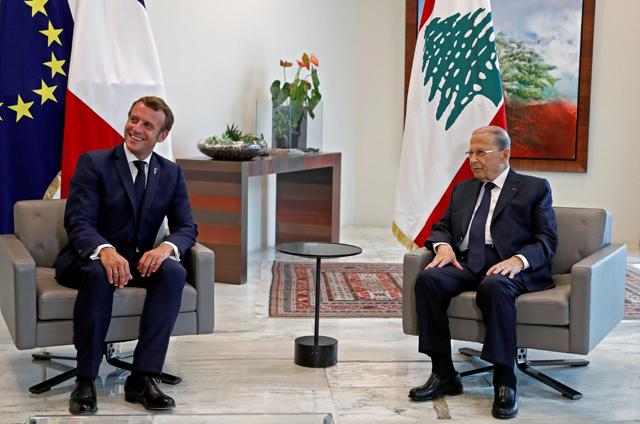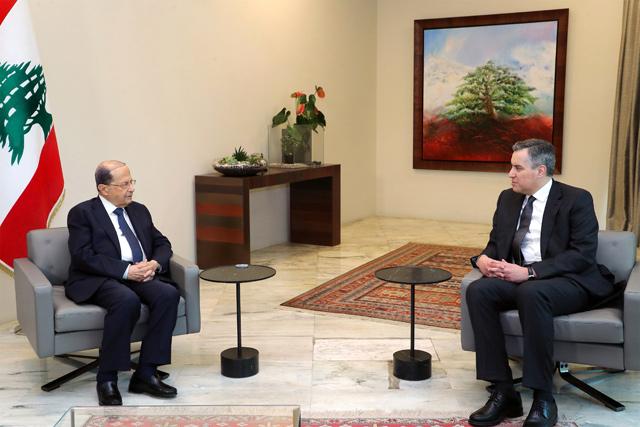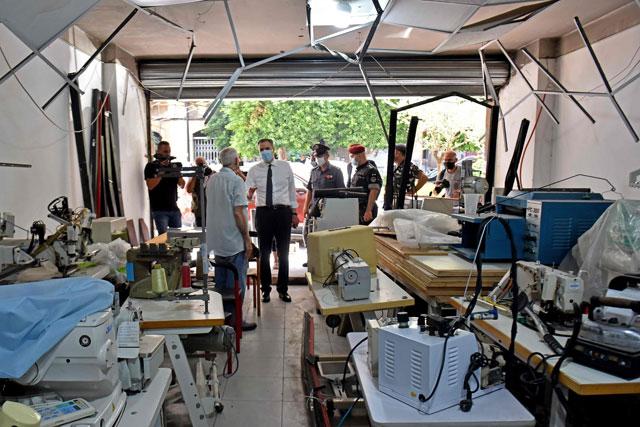You are here
Macron in high-stakes Lebanon reform drive
By AFP - Sep 01,2020 - Last updated at Sep 01,2020

French President Emmanuel Macron (left) meets with Lebanese President Michel Aoun at the presidential palace in Baabda, east of the Lebanese capital Beirut, on Tuesday (AFP photo)
BEIRUT — French President Emmanuel Macron pressed his "risky" drive for political change in Lebanon Tuesday, as the former French mandate marked its centenary while teetering on the brink of the abyss.
Macron has set an ambitious goal for his second visit since a deadly August 4 explosion ravaged Beirut: To press for change without being seen as a meddler.
He kicked off his trip on Monday, not by visiting political leaders, but by spending more than an hour with singing legend Fairuz, who at 85 is a rare unifying figure in Lebanon.
Macron ticked off more symbols to mark 100 years Tuesday since French mandate authorities proclaimed the creation of Greater Lebanon.
In the Jaj forest northeast of Beirut, he planted a cedar tree — Lebanon's national symbol — to express "confidence in the future of the country", his office said in a statement.
The French air force flew overhead leaving a trail of red, white and green smoke — the colours of the country's flag.
Lebanon "will be able to rise again," Macron later said in a post on Twitter.
Macron then returned for a second visit to Beirut port, ground zero of the colossal blast that killed more than 180 people, wounded at least 6,500 others and laid waste to entire districts of the capital.
He oversaw the distribution of aid from the French helicopter carrier Tonnerre which arrived in Beirut on August 14.
Macron also met with some 400 French soldiers working with the Lebanese army to clear thousands of tonnes of debris from the port, vital for a country whose food is 85 per cent imported.
The Beirut explosion compounded Lebanon’s worst economic crisis since the 1975-1990 civil war, with a UN agency warning on Sunday that more than half of the population risk a food crisis by the end of the year.
It caused up to $4.6 billion worth of damage and a blow to economic activity of up to $3.5 billion, according to a World Bank assessment.
On August 9, the international community pledged 252.7 million euros (around $300 million) in emergency aid during a video conference jointly organised by France and the United Nations.
Macron said on Tuesday that he is ready to host a second aid conference for blast-hit Lebanon next month.
“I am ready for us to organise, maybe around mid or late October, another international support conference with the United Nations,” he said after meeting UN representatives and local aid groups in Beirut.
Later on Tuesday, Macron will meet with under-fire political leaders widely blamed for the explosion, which was caused by a stockpile of ammonium nitrate fertiliser that had languished in the port for years.
Macron, who upon arriving on Monday called for a so-called “mission government”, has said his position towards Lebanon’s political establishment “is unchanged: Demanding without interfering”.
This is why he said it was not his place to “approve” of Monday’s designation of Mustapha Adib as prime minister.
But Adib, a little known 48-year-old diplomat who since 2013 had served as Lebanon’s ambassador to Germany, “has to be given all the tools to succeed... so he can implement reforms” long demanded by the international community, Macron said on Tuesday.
Adib was named on Monday by political leaders widely seen as inept and corrupt by demonstrators who have taken to the streets in mass protests since October 17 against the entire political class.
The protest camp has already rejected the choice of Adib as premier, charging that he is too close to established political circles.
“No Cabinet by or with the murderers” said posters brandished by demonstrators who waited for Macron outside Fairouz’s home.
After a lunch with Aoun in the presidential palace on Tuesday, he will meet with representatives of the country’s top nine political blocs in the second such talks since the blast.
Representatives of the powerful Hizbollah movement, designated by the US as a terrorist group, will be among those meeting Macron.
The French president has justified his openness to “talk with everyone”, including Hizbollah, by saying the Iran-backed group is “a political force that is represented in parliament”.
With the protest camp warning against giving another lease of life to a hereditary ruling class that will only pay lip service to reform, Macron admitted in an interview that his brokering drive was a gamble.
“It’s a risky bet I’m making, I am aware of it... I am putting the only thing I have on the table: my political capital,” he told Politico.
Related Articles
BEIRUT — Lebanon's premier-designate stepped down on Saturday, saying he had been unable to form a reform-minded government to lift the coun
BEIRUT — Lebanon's under-fire political leaders Monday designated a new prime minister, the diplomat Mustapha Adib, to tackle the country's
BEIRUT — Lebanon's prime minister designate Mustapha Adib pledged to form a 'government of experts' to drive desperately needed reforms in t
















